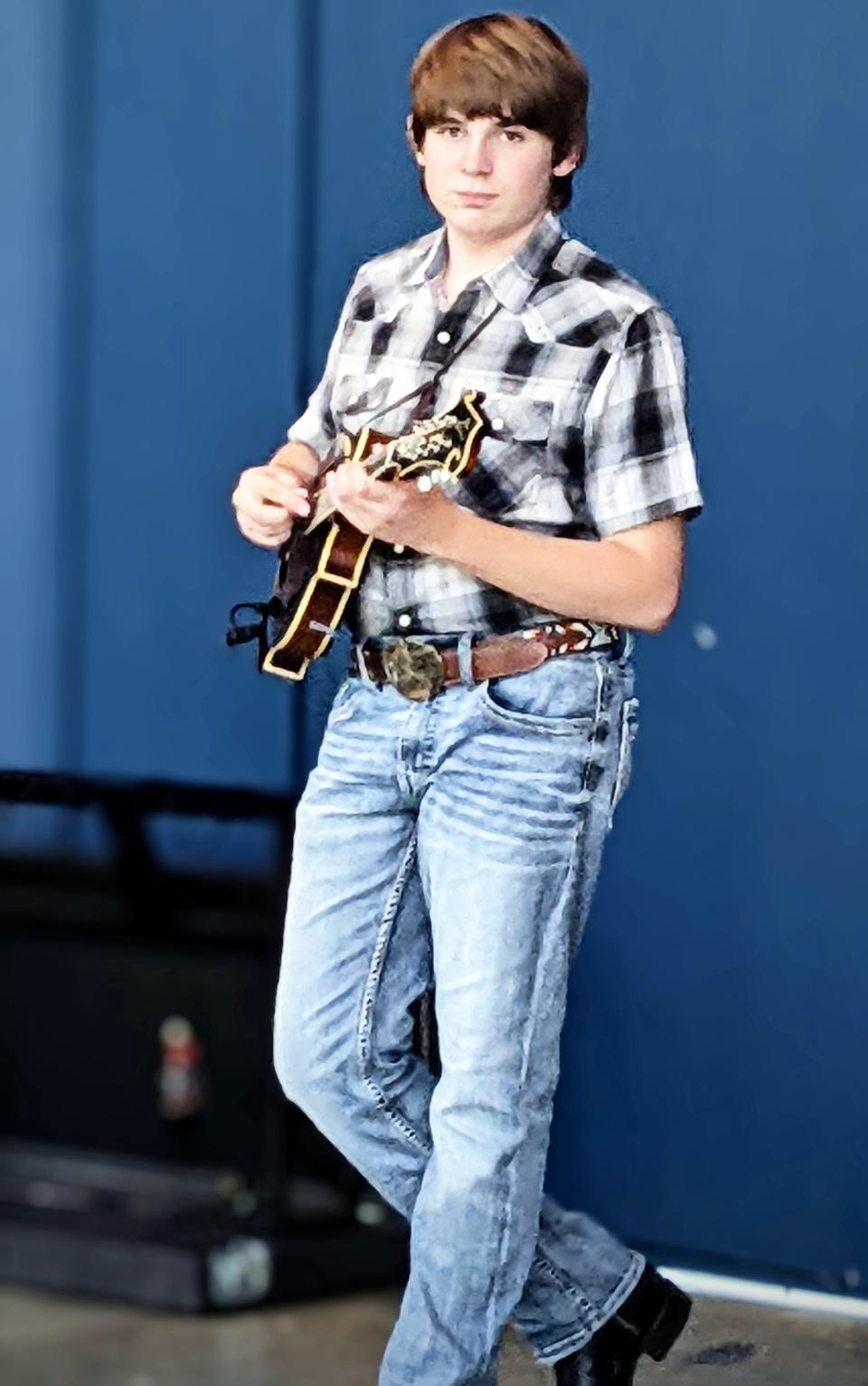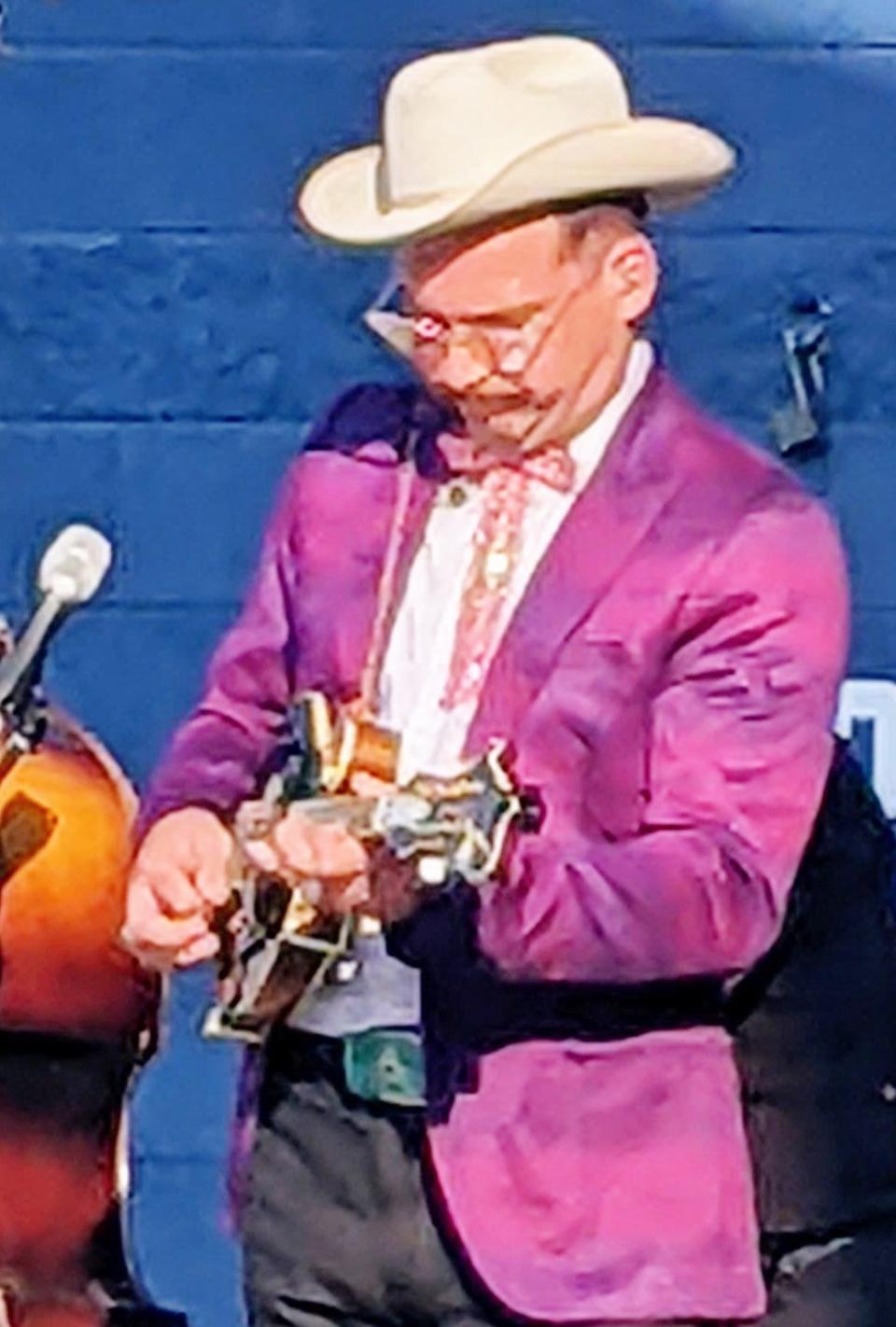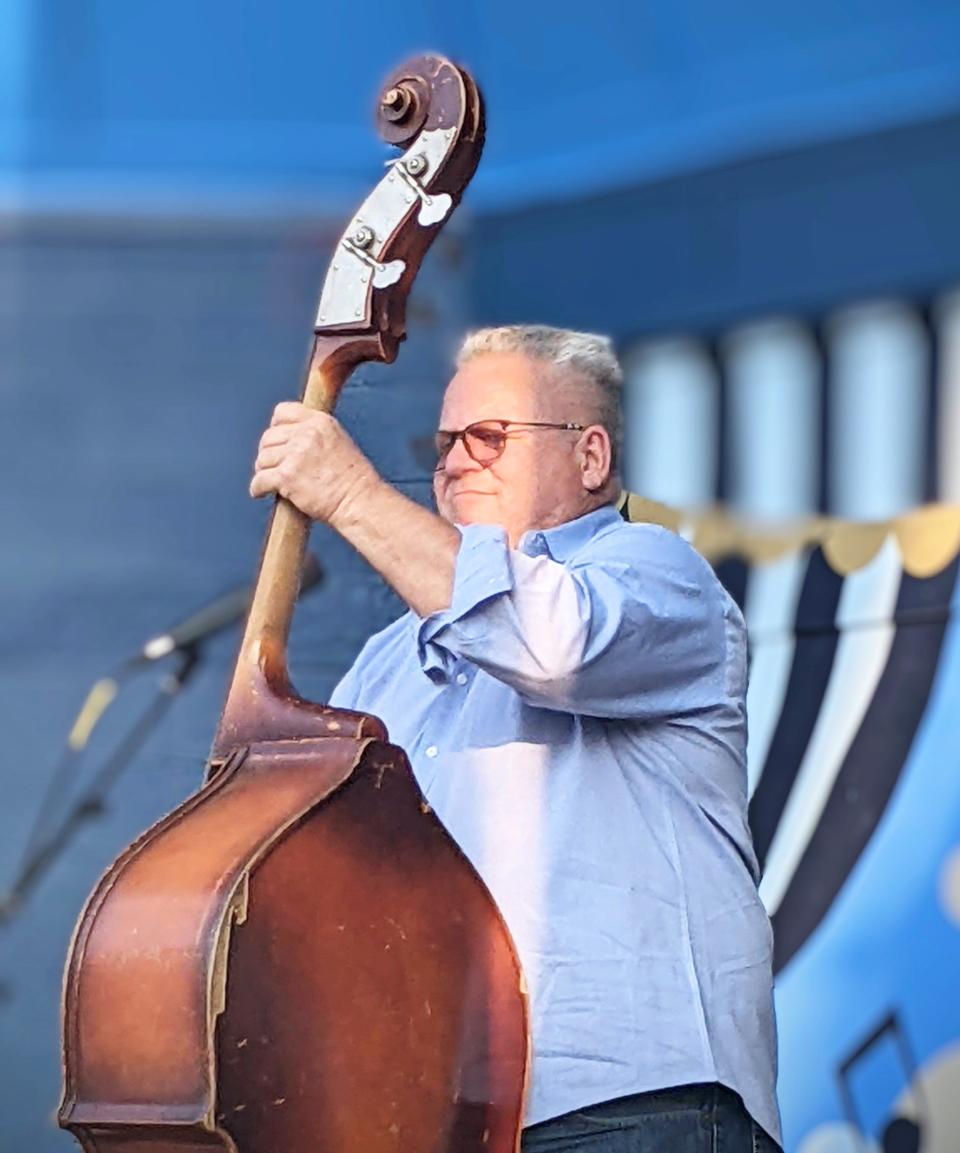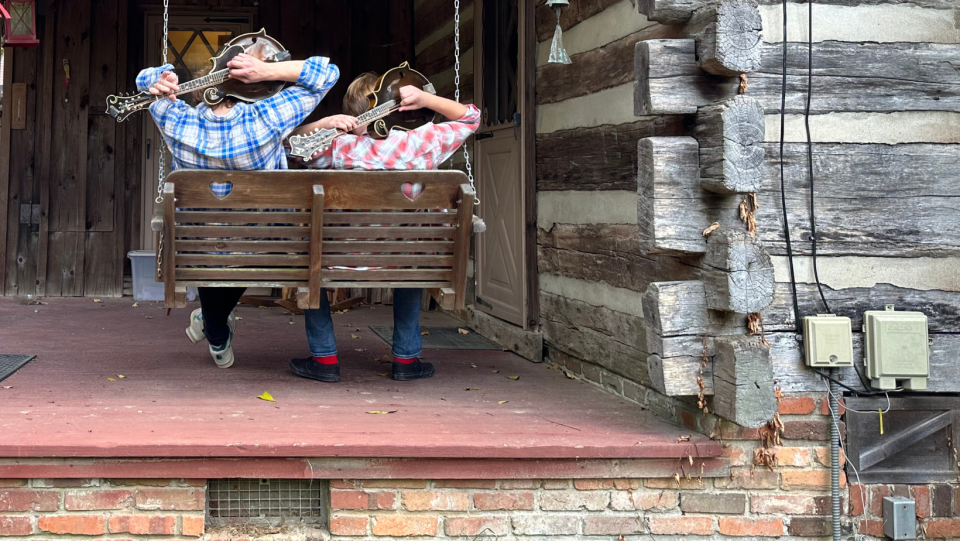Wyatt Ellis' life in Happy Valley: Proud, dignified and true.
- Oops!Something went wrong.Please try again later.
This is a Christmas card, a record review, and an artist profile for the 2024 Big Ears Festival, all rolled into one.
It’s also the story of a musical prodigy’s journey. And I’m going to give you the moral of the story right up front: as a parent, if you stay invested in your kids’ success, their accomplishments will surpass your wildest dreams and reach farther than the limits of your imagination.
It’s the week before Christmas
and the mandolin’s call
serenades Baby Jesus
on the last days of Fall.
In a teenager’s hands,
the maple and spruce
with eight strings made of steel
let their praises cut loose.
The sound, warm as a sunrise
that kisses the trees
on the Smoky Mountain skyline
of East Tennessee.
Like the Little Drummer Boy,
pa-rum-pum-pum-pum,
this bluegrass virtuoso
is as humble as they come.
So to make Christmas merry
and start the New Year,
share the tunes that he’s written
as a gift to your ears.

There’s something about the mandolin that has produced an unusual number of prodigies who pick up the instrument at an early age and have an instant affinity for it. Maybe it’s the mandolin’s compact body and short fingerboard, or it’s tuning, identical to a violin’s. Maybe it’s the mandolin’s dual nature as a metronomic time keeper and a runaway solo showboat. Or maybe it’s ‘cause it can be so dang loud.
Whatever it is that makes it so inviting, Wyatt Ellis was struck by the mandolin at 9 years old when he heard Bobby Osborne play “Rocky Top.” Right after that, his dad brought home a $100 mandolin from a pawn shop.
I might be making up the pawn shop detail, but it sounds authentic.
In 2019, the summer Wyatt was 10, his parents brought him to Oak Ridge to hear Ricky Skaggs (a former child prodigy) and Kentucky Thunder at the ORNL-FCU Summer Sessions. Wyatt was a typical adolescent, splitting his time between soccer, home school studies, and the online world, living with his parents in the pastoral enclave of Vonore. But that summer evening at the Oak Ridge Civic Center with Kentucky Thunder ... it might have tattooed a lightning bolt on his forehead. Some kind of magic happened. The concert had a bigger audience than any other in the four summers since, but its more important historical footnote is that it lit the fire in Wyatt Ellis’ creative bluegrass heart.
Did Ricky Skaggs play “Rocky Top” that evening? I can’t remember. Doesn’t really matter, because not long after Wyatt saw Ricky Skaggs in Oak Ridge, he started down the path to learn everything he possibly could about the mando.
In 2020, of course, the entire world spasmed with COVID-19 madness and shut down like a clam out of water. Every working musician in America (and elsewhere) found their world upside-down, and those with a healthy survival instinct made themselves available online, to fans, but more importantly to aspiring musicians. And Wyatt, nestled there in Vonore, took full advantage of the new world that opened up when the old world shut down. At 11, 12, and 13 years old, he saw the future, and it was him.
Wyatt had a one-on-one Tennessee Folklife mentorship with Sierra Hull (a former child prodigy herself), and a one-on-one relationship with the late Bobby Osborne, who turned “Rocky Top” into the Tennessee anthem. Bobby and Wyatt got together through the Kentucky School of Bluegrass and Traditional Music.
Wyatt has been guided through the mine fields by the Po’ Ramblin’ Boys’ incredibly generous C.J. Lewandowski, a devoted Osborne disciple. And in the past two years, as bluegrass does, these connections have woven Wyatt into the tapestry that is Americana music.
On Feb. 2, Wyatt Ellis will release his first album, “Happy Valley,” consisting of 12 original instrumental tunes written when he was 12, performed by him and his far-reaching bluegrass family, which now includes Marty Stewart, Jake Workman, Scott Napier, Alan Bibey, David McLaughlin, David Harvey, Christopher Henry, Lauren Price Napier, Danny Roberts, Mike Compton, Mike Bub, Deanie Richardson, Justin Moses, Sierra Hull, Dominick Leslie, Maddie Denton, and Corey Walker.
This is like jumping from middle school football to playing in the NFL. At 14 years old.

"With his passion for music and the history involving Bluegrass, Wyatt reminds me of myself, but on a heightened level. His talent and understanding is something players twice his may not be able to accomplish. “Happy Valley” is just the beginning of Wyatt’s journey and it’s a strong foundation to build his Bluegrass home upon. Congrats Buddy," said C.J. Lewandowski of The Po' Ramblin' Boys.
2023 has been a momentous year for Wyatt, but 2022 didn’t end with a whimper. In October ’22, at 13, he played “Walls of Time” beside Molly Tuttle and Peter Rowan at Rowan’s induction into the Bluegrass Hall of Fame at the IBMA Awards.

In February, Wyatt did a guest spot at the Grand Ole Opry with the infectious Dailey & Vincent, where he burned up Bill Monroe’s “Rawhide.” In March, Wyatt played at Doc Watson’s 100th birthday concert with the incredible Billy Strings in Winston-Salem. Then he went toe-to-toe with Sam Bush at MerleFest’s Mandolin Mania in Wilkesboro, North Carolina.
In June, he did a cameo appearance in Oak Ridge with the Po' Ramblin’ Boys at the Summer Sessions. In September, he released “Grassy Cove,” the first single from his new album, and it instantly went to No. 1 on the bluegrass charts.
In November, he made his solo artist debut at the Grand Ole Opry, backed by a band any bluegrass performer on Earth would kill for. And on this trip to the Opry, he stood squarely in the Circle ... like he owned it.
Then, to wrap up 2023, it was announced that, three months from now, Wyatt will become the youngest artist ever to be featured at the Big Ears Festival in Knoxville, which Spin Magazine just named the “Best Music Festival of the Year.”
Let that sink in for a minute. I can see his memoir now. “What I Did in the Eighth Grade,” by Wyatt Ellis. He’s home schooled, of course. You might want to let that sink in as well.
The beautiful thing about “Happy Valley” is that the album is like an orrery, one of those mechanical solar system models that illustrate the relative positions and orbits of the planets. The titles of the album’s instrumental tunes reference locations in East Tennessee. Turn the crank, start up the music, and the planets begin to orbit in your brain. In your memory. Grassy Cove. Sandy Gap. White’s Creek. The Little Pigeon River. Townsend. Johnson Mountain. Maryville. For a 12-year-old kid to write tunes as sophisticated and emotionally connected as these is flat-out amazing. Sort of Mozartian.
Most of “Happy Valley” was recorded at a revered studio called the Tractor Shed. It sits behind the former home of Opry legend Grandpa Jones, on Happy Valley Road in Goodlettsville, just north of Nashville.

The album showcases Wyatt’s firm grasp on the subtleties of composing, but it also puts on display his multi-instrumental talents. If it has strings, he can play it. And this ability has a magical magnetism associated with it. Irreplaceable and treasured instruments find their way into his hands. On the cut called “Two Rivers Waltz,” he’s playing the fiddle immortalized by the genius Vassar Clements. The same voodoo happens with Wyatt that possesses Billy Strings when he picks up Doc Watson’s or Tony Rice’s guitar. So the answer to the immortal rhetorical question is definitely “yes,” the circle will be unbroken.
To prove the point, when Marty Stewart recorded his contribution to Wyatt’s tune “Blue Smoke,” it was done at Cash Cabin, Johnny Cash’s studio. It’s the circle.
Every single tune, every guest’s collaborative efforts, every cross pollination of imaginations, every minute of “Happy Valley” is rich, with history and the future bound together like a double helix, and the DNA of bluegrass is there for everyone to see.
The circle gets bigger and bigger. And we are so lucky to watch this. Wyatt Ellis, Molly Tuttle, Billy Strings, and the scores of partners in their bands who push them higher and faster, who keep them proud, dignified and true ... they’re not livin’ the dream. They are the dream.
Joni Mitchell said, “We’re captive on the carousel of time. We can’t return, we can only look behind, from where we came, and go round and round and round in the Circle Game.” This may be mixing metaphors, but the Circle Game is just monotonous.
I had a friend who owned a champion Tennessee Walking Horse named “Pardon Me, Gov’nor.” Wyatt Ellis is not on one of Joni Mitchell’s painted ponies going up and down. He’s thundering through Happy Valley and Grassy Cove on Gov’nor.
Remember that $100 mandolin? Now Wyatt plays a 100-year-old Gibson F-5 built by Lloyd Loar. Pretty close to priceless.
Visit www.wyattellis.com right now to pre-order “Happy Valley,” coming out Feb. 2, 2024. That’d make a nice last-minute Christmas surprise for any kid in your life who needs to see that, if you put in the sweat equity, anything is possible.
Merry Christmas, y’all. May Peace return to Israel.
John Job is a longtime Oak Ridger and frequent columnist for The Oak Ridger.
This article originally appeared on Oakridger: Wyatt Ellis' life in Happy Valley: Proud, dignified and true.

